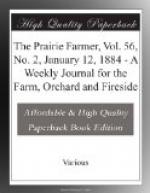SPECIALTY IN FARMING.
This subject in my estimation should begin to attract attention, especially among the large land owners and farmers of the West. If we study the whole catalogue of money-making enterprises and money-making men, we find that the greatest success has been attained where there has been the greatest concentration on a special line of work. True, it is, that specialists are subject to unexpected changes of the times, and if thrown out of their employment are not well prepared for other work, and yet their chances for success as compared with the “general idea” man are as ten to one.
For an example look at science. How has it advanced? Is it not by the invaluable aid of men who have given their whole lives to the solution of some special problem? It could not be otherwise. If every scientist had attempted to master the majority of scientific truths before he was contented to concentrate his time on some special branch of science, science would have progressed little or none at all. Linnaeus opened the way in botany, and the world profited by his blunders. But to be brief—it seems to me that the most successful farmer in the future is to be the man who can so arrange his work that he is led into the deepest research on some one branch of farming. He must be a specialist. He must thoroughly master the raising of fine stock for breeding purposes, for practical profit and the shambles. Attend stock associations, and hear witnesses testify on every hand to the difficulties connected with properly rearing calves for breeding purposes.
The honest breeder, though full of ideas, acknowledges he knows but very little on breeding. His time in farm life, for twenty years or more has been devoted to too many things. Is not the expert swine-grower the successful man? Books are something, but practical experience is something more. It matters little however practical the author of a work on agricultural science may be, unless the man who reads has some practical experience, his application of the author’s truths will be a total failure.
We insist, therefore, that the successful farmer must be a specialist. He must devote his time to special more than to general farm work. You ask me to outline in detail the idea thus advanced. You somewhat question its practicability. To attempt it might lead to endless discussion, but let us reduce to example. Farmer A. raises cattle, hogs, and sheep for breeding purposes, devotes some attention to fine horses, and keeps thirty-six cows for dairy purposes. Farmer B. devotes his entire attention to dairying and has invested in dairy cows as much money as A. has in all his stock. Is it not evident that though each farmer began life the same year, the latter man will make the most money, providing the section he is in demands dairy work? It seems to me so. And if we further place limit on the dairyman’s work, we should say he can not afford, with fifty or seventy-five cows, to give as much attention to the manufacture of cheese and butter as that work necessarily demands. Even though he employs a specialist in creamery work, he himself must be a specialist to some extent. We say to investing farmers do not put $500 into horses, $500 into fine cattle, and $500 into swine, but concentrate on one class of stock, and give that your time.




